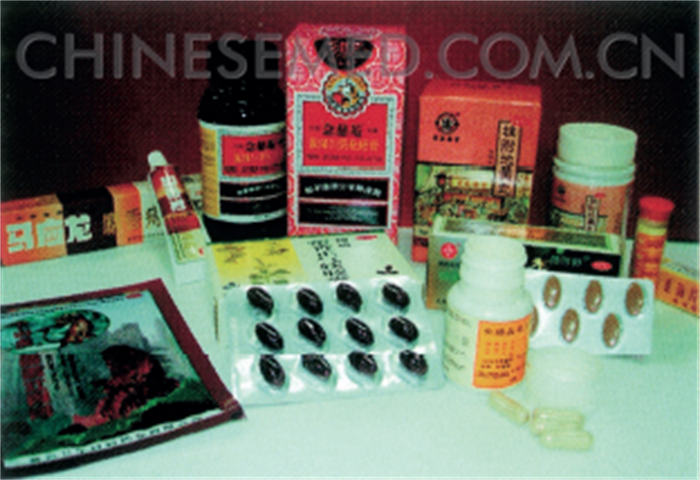Zhongyao jixing refers to the form that Chinese medicines take after having been processed.Zhongyao jixing consists of those that are:
refers to the form that Chinese medicines take after having been processed.Zhongyao jixing consists of those that are:
Taken orally: decoctions (tangji  ), pills (wanji
), pills (wanji  ), medicinal powders (sanji
), medicinal powders (sanji  ), soft herbal extracts (gaoziji
), soft herbal extracts (gaoziji  ), tinctures (jiuji
), tinctures (jiuji  ), distillates (luji
), distillates (luji  );
);
For external use: topical ointments (ruangaoji  ), plasters (yinggaoji
), plasters (yinggaoji  ), pellets (danji
), pellets (danji  ), medicinal powders (sanji
), medicinal powders (sanji  ), embrocations (tucaji
), embrocations (tucaji  ), soakers(jinxiji
), soakers(jinxiji  ), fumigants (xunji
), fumigants (xunji  );
);
For use in body cavities: suppositories (shuanji  ), medicinal strips (yaotiao
), medicinal strips (yaotiao  ), troche lozenges (dingji
), troche lozenges (dingji  ), sprays (qiwuji
), sprays (qiwuji  ), inhalants (xiruji
), inhalants (xiruji  );
);
For injection purposes: intravenous injections (jingmai zhushiji  ), muscular injections (jirou zhushiji
), muscular injections (jirou zhushiji  ).
).
Different types of dosage forms possess different effects. There is an ancient saying that the decoction (tangji  ) of Chinese medicine is good for treating major illness, and medicinal powder (sanji
) of Chinese medicine is good for treating major illness, and medicinal powder (sanji  ) is a faster way of curing sickness, whereas the pill (wanji
) is a faster way of curing sickness, whereas the pill (wanji  ) produces slower but lasting results. Thus the dosage form of Chinese medicines and the treatment of the patient’s illness are closely related. Such experiences were accumulated by our ancestors over thousands of years. Therefore one cannot replace the prescribed dosage form of a Chinese medicine with another dosage form as he pleases, so as to avoid affecting the curative effects.
) produces slower but lasting results. Thus the dosage form of Chinese medicines and the treatment of the patient’s illness are closely related. Such experiences were accumulated by our ancestors over thousands of years. Therefore one cannot replace the prescribed dosage form of a Chinese medicine with another dosage form as he pleases, so as to avoid affecting the curative effects.
Decoction (tangji  )
)
This is the most traditional form of Chinese medicine. It is a fluid preparation produced by means of decocting (jianzhu  ) or soaking (jinpao
) or soaking (jinpao  ) to remove the residue and obtain the juice. Characteristics:
) to remove the residue and obtain the juice. Characteristics:
1. Composition of medicinal materials is highly flexible; dosage can be adjusted based on the illness.
2. Absorbed rapidly by the intestines and stomach; curative effects produced rapidly.
Suitable users: patients having an illness for the first time; acute diseases and serious illness.
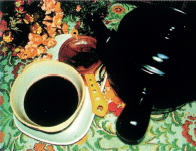
Pill (wanji  )
)
This is a spherical or ball-like medicinal preparation made by grinding the Chinese herbs into fine powder and adding suitable adhesives (nianheji  ), also called excipients (fuxingji
), also called excipients (fuxingji  ) or auxiliary materials. Early pills are developed based on decoctions (tangji
) or auxiliary materials. Early pills are developed based on decoctions (tangji  ). The various kinds of pills are classified depending on the adhesive used. Honey, water or rice paste, flour paste, wine, vinegar, medicinal juice are usually used as adhesives. But honeyed pills (miwan
). The various kinds of pills are classified depending on the adhesive used. Honey, water or rice paste, flour paste, wine, vinegar, medicinal juice are usually used as adhesives. But honeyed pills (miwan  ) and water-paste pills (shuiwan
) and water-paste pills (shuiwan  ) are more commonly used.
) are more commonly used.
Honeyed pills (miwan  ): medicinal pills using honey as the adhesive.
): medicinal pills using honey as the adhesive.
Water-paste pills (shuiwan  ): medicinal pills using cold boiled water, medicinal juice or other medicinal materials such as millet wine.
): medicinal pills using cold boiled water, medicinal juice or other medicinal materials such as millet wine.
Characteristics: effect of medicine is slow but sustained.
Suitable users: patients with chronic illness, having long-term poor health condition.
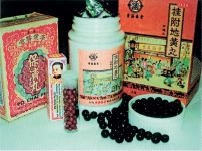
Medicinal powder (sanji  )
)
This refers to the powdery medicinal preparation produced by evenly mixing one or more types of medicinal materials. It can be grouped into orally-taken medicinal powder  and externally-used medicinal powder
and externally-used medicinal powder  .
.
Characteristics: rapidly absorbed, producing fast results, easy to carry and consume. But some pungent medicinal materials absorb moisture and deteriorate easily.
Suitable users: patients with acute diseases.
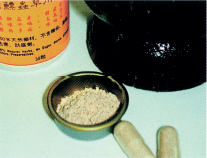
Herb plaster (gaoji  )
)
There are two types of traditional herb plaster: one is soft herb extract for internal use, the other being herb plaster for external use.
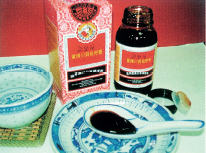
Soft herbal extract (gaoziji  ):
):
This refers to the semi-fluid medicinal preparation made by continuously adding water to decoct the Chinese medicines, after which the residue concentrate is removed and crystal sugar (or white sugar and brown sugar) is added.
Plaster (gaoyaoji  ):
):
This refers to the externally used medicinal preparation plasters. The medicines are refined from vegetable oil and red lead powder.
Characteristics: concentrated and fine medicinal fluid for easy absorption, producing fast results, easy application.
Suitable users: patients having long-term illness, poor health and chronic illness.
Tincture (jiuji  )
)
Also known as medicinal wine (yaojiu  ), tincture is a transparent medicinal fluid produced by soaking slices of the Chinese medicinal herb with white spirit or millet wine.
), tincture is a transparent medicinal fluid produced by soaking slices of the Chinese medicinal herb with white spirit or millet wine.
Characteristics: enhances the curative effect of medicine, absorbs well, yields fast results, able to prevent and cure illness.
Suitable users: patients having poor health who need nourishment, pain from rheumatism, injuries from falls, fractures, contusions and strains.
Tablet (pianji  )
)
It is a more recent form of Chinese medicinal preparation. Medicinal powder and extracts are added to the adhesive, producing a solid rounded dosage form through tablet pressing or coating. If it is not coated with sugar, it is calledsupian  .
.
Characteristics: precise dosage, easy to consume and carry. But absorption takes longer and the medicine is slower in taking effect.
Suitable users: people with robust physiques, patients on short-term medication.
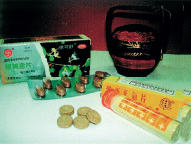
Injection (zhusheji  )
)
This is also called needle preparation (zhenji  ), which is a new type of Chinese medicinal preparation. Using Chinese medicinal materials as its raw ingredients, it is a disinfectant medicinal solution produced for hypodermic, injection purposes, via the process of extraction, refining, fluid mixing, quality control, sealing and disinfection.
), which is a new type of Chinese medicinal preparation. Using Chinese medicinal materials as its raw ingredients, it is a disinfectant medicinal solution produced for hypodermic, injection purposes, via the process of extraction, refining, fluid mixing, quality control, sealing and disinfection.
Characteristics: precise dosage, producing fast curative effects, easy dispensation of medicine.
Suitable users: patients needing emergency treatment, or in treating serious illness like tumour, etc.
